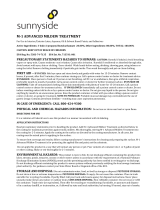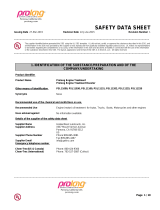Page is loading ...

Material Safety Data Sheet
N/A: Not Applicable N/D: Not Determined N/E: Not Established N/R: Not Required Est.: Estimated
Perma-Wash MSDS (4-10-9) Page 1 of 7 pages.
Section 1 General Information
Manufacturer:
Rust-Oleum Corporation
11 Hawthorn Parkway
Vernon Hills, IL 60061
24 Hour Assistance: 1-847-367-7700
www.rustoleum.com Date: April 10, 2009
Product Name: Zinsser Perma-Wash Disinfectant & Fungicide Interior Concentrate
Codes: 60600 60601 60602 60605
Section 2 Hazardous Ingredients
OSHA ACGIH
Hazardous Component
CAS#
PEL TLV
Oxychlorine Compounds N/A N/E N/E
Dimethyl Didecyl Ammonium Chloride 7173-51-5 N/E N/E
Alcohols N/A N/E N/E
Section 3 Hazard Identification
Emergency Overview:
Hazards to Human & Domestic Animals
Caution: Cause moderate eye irritation. Avoid contact with eyes or clothing. Wash thoroughly
with soap and water after handling. Remove contaminated clothing and wash before reuse. Avoid
contamination of food.
Primary Routes of Exposure:
Skin Contact
Eye Contact
Inhalation
Potential Acute Health Effects:
Eye Contact: Causes moderate irritation.
Skin: Causes irritation. Prolonged contact may cause dermatitis.

N/A: Not Applicable N/D: Not Determined N/E: Not Established N/R: Not Required Est.: Estimated
Perma-Wash MSDS (4-10-9) Page 2 of 7 pages.
Ingestion: Ingestion is harmful. Causes irritation of the gastrointestinal tract, nausea,
vomiting and diarrhea. Ingestion of large amounts may cause central nervous system depression.
Inhalation: Inhalation causes respiratory tract irritation and coughing. Exposure to high
concentrations results in central nervous system depression with symptoms of headache,
dizziness, fatigue, muscular weakness, drowsiness, in-coordination and unconsciousness.
Note: Upon contact with acids, organic materials, reducing agents or chlorine donors, this
product will release CHLORINE DIOXIDE gas. Inhalation of chlorine dioxide can cause
respiratory tract irritation, coughing, wheezing and burns of the mucous membranes. Inhalation
of large amounts may lead to pulmonary edema and bronchitis. Prolonged or repeated inhalation
of chlorine dioxide gas may cause chronic bronchitis or emphysema. Direct contact with chlorine
dioxide causes eye and skin irritation and may cause burns. Oxychlorine compounds have been
shown to cause blood disorders in laboratory animals. May aggravate existing medical conditions
such as eye, skin and respiratory disorders and allergies.
(See also Sections 4, 8, and 11for related information)
Section 4 First Aid Measures
KEEP OUT OF REACH OF CHILDREN
Eye contact: If in eyes, hold eye open and rinse slowly and gently with water for 15-20
minutes. Remove contact lenses, if present, after the first 5 minutes, then continue rinsing eye.
Call a poison control center or doctor for treatment advice
Skin contact: Take off contaminated clothing. Rinse skin immediately with plenty of water for
15-20 minutes. Call a poison control center or doctor for treatment advice
Ingestion: If swallowed, call poison control center or doctor immediately for treatment advice.
Have person sip a glass of water if able to swallow. Do not induce vomiting unless told to do so
by the poison control center or doctor. Do not give anything by mouth to an unconscious person.
Inhalation: Move person to fresh air. If person is not breathing, call 911 or an ambulance,
then give artificial respiration, preferably by mouth-to-mouth, if possible. Call a poison control
center or doctor for further treatment advice.
Note to Physician: Probable mucosal damage may contraindicate the use of gastric lavage

N/A: Not Applicable N/D: Not Determined N/E: Not Established N/R: Not Required Est.: Estimated
Perma-Wash MSDS (4-10-9) Page 3 of 7 pages.
Section 5 Fire Fighting Measures
Flash Point (method): No flash point up to 90 degrees C (boiling point 93 degrees C)
Method: PMCC
This product is an oxidizing material. Oxidizing materials increase the flammability of combustible,
organic or other readily oxidizable materials.
Contact with acids, organic materials, reducing agents or chlorine donors will produce chlorine dioxide
gas and heat. The lower explosive limit (LEL) for chlorine dioxide is 10% in air. Flush area with large
amounts of air to keep the chlorine dioxide concentration below 10%.
Sodium chlorite has been shown, where allowed to dry, to ignite by heat or friction at concentrations of
5% or above. This product is significantly below this concentration and has not been shown to enhance
combustion or self-ignite when allowed to dry.
Extinguishing Media: Water
Protection of Firefighters: Evacuate personnel to a safe area. Wear self-contained breathing
apparatus (SCBA) and full protective equipment.
Section 6 Accidental Release Measures
Safeguards (Personnel): Note: Review Fire Fighting Measures and Handling sections
before proceeding with clean-up. Use appropriate PERSONAL PROTECTIVE EQUIPMENT
during clean-up.
Accidental Release Measures: Flush with water to dilute. Do not allow contact with rags,
paper or other oxidizable materials. For large spills, evacuate area, contain liquid and transfer to
closed polyethylene drums. Prevent contact with oxidizers and acids. Do not allow liquid
solution to dry. Keep out of water supply. Flush area with water after liquid is removed.
(See also Section 8 for information on Exposure Controls and Personal Protective Equipment)
Section 7 Handling and Storage
Handling: Do not breathe vapor or mist. Avoid contact with eyes, skin or clothing. Wash
thoroughly after handling. Wash clothing after use. Avoid contamination of food and feed
products. Do not allow solution to evaporate to dryness. Protect from heat, freezing and
ultraviolet light. Keep container closed
Storage: Store in original closed container in a cool, dry place away from heat and open
flame.

N/A: Not Applicable N/D: Not Determined N/E: Not Established N/R: Not Required Est.: Estimated
Perma-Wash MSDS (4-10-9) Page 4 of 7 pages.
Section 8 Exposure Controls / Personal Protection
Engineering Controls: Use only with adequate ventilation. Safety shower and eyewash
facilities should be immediately accessible.
Personal Protective Equipment (PPE):
Eye Protection: Wear safety glasses. Where splash potential exists, wear chemical splash
goggles.
Skin Protection: Impervious gloves.
Respiratory Protection: Wear NIOSH approved respiratory protection, as appropriate.
Protective Clothing: Where there is potential for skin contact have available and wear as
appropriate impervious gloves, apron, pants and jacket.
General Hygiene Practices: Avoid eye and skin contact. Avoid breathing vapors. Wash
hands before eating and drinking. Do not smoke while using this material.
Section 9 Physical Data
Appearance: Clear Odor: Alcohol
Physical State: liquid Solution pH: 9.0
Boiling Point: 93.3 degrees C Vapor Pressure: Approximates Water
Solubility in Water: 100%
Density: 8.44 lb/gallon
Specific Gravity (water = 1): 1.012
Section 10 Stability and Reactivity
Stability: Stable
Hazardous Polymerization: Polymerization will not occur
Hazardous Decomposition Products: Decomposes with heat. Thermal decomposition
will produce chlorine dioxide gas.
Incompatibility with Other Materials: Contact with acids, organic materials, reducing
agents and chlorine donors will release chlorine dioxide.

N/A: Not Applicable N/D: Not Determined N/E: Not Established N/R: Not Required Est.: Estimated
Perma-Wash MSDS (4-10-9) Page 5 of 7 pages.
Section 11 Toxicological Information
Animal Data:
Perma-Wash Disinfectant & Fungicide Interior Concentrate:
Oral LD50: 3300 mg/kg in rats
Primary Dermal Irritation Index: 2.33 in rabbits
Primary Eye Irritation: moderately irritating in rabbits
Chlorine Dioxide:
Oral LD50: 292 mg/kg in rats
Carcinogenicity: None of the components present in this material at concentrations equal to
or greater than 0.1% are listed by IARC, NTP, OSHA, or ACGIH as a carcinogen.
(See also Section 15 for related information)
Section 12 Ecological Information
Aquatic Toxicity:
Sodium Chlorite: 48 hour TL50 – daphnia magna: 0.29 mg/L.
Environmental Hazards: This product is toxic to fish and other aquatic organisms. Do not
discharge effluent containing this product into lakes, streams, ponds, estuaries, oceans or other
waters unless in accordance with the requirements of a National Pollutant Discharge Elimination
System (NPDES) permit and the permitting authority has been notified in writing prior to
discharge. Do not discharge effluent containing this product to sewer systems without previously
notifying the local sewage treatment plant authority. For the guidance contact your State Water
Board or Regional Office of the EPA.
Section 13 Disposal Considerations
RCRA Hazardous Waste: This material is not considered hazardous waste under Federal
Hazardous Waste Regulations (40CFR 261). However, state and local requirements for waste
disposal may be more restrictive or otherwise differ from federal regulations. Chemical additions,
processing or otherwise altering this material may render the waste management information
presented in this MSDS incomplete, inaccurate or otherwise inappropriate. Consult all applicable

N/A: Not Applicable N/D: Not Determined N/E: Not Established N/R: Not Required Est.: Estimated
Perma-Wash MSDS (4-10-9) Page 6 of 7 pages.
federal, state, and local regulations regarding the proper disposal of this material. Treatment,
storage, transportation, and disposal must be in accordance with applicable Federal,
State/Provincial, and Local Regulations.
Recommended Waste Disposal Method: Do not contaminate water, food or feed by storage
or disposal. Wastes resulting from the use of this product may be disposed of on site or at an
approved waste disposal facility. For container disposal, triple rinse (or equivalent), then place in
trash receptacle.
Section 14 Transportation Information
This product is not regulated as a hazardous material by DOT, IMO, or IATA
Section 15 Regulatory Information
CERCLA:
The Comprehensive Environmental Response Compensation and Liability Act of 1980 (CERCLA)
requires notification to the National Response Center for releases of quantities of Hazardous Substances
equal to or greater than the reportable quantities (RQs) in 40 CFR 302.4 (for CERCLA 102).
Components present in this product at a level which could require reporting under the statute are:
Chemical Name CAS# Maximum Concentration (Wt. %)
None N/A N/A
SARA Title III, section 311/312:
The Superfund Amendments and Reauthorization Act of 1986 (SARA) Title III requires emergency
planning based on Threshold Planning Quantities (TPQs) and release reporting based on Reportable
Quantities (RQs) in 40 CFR 355 (used for SARA 302, 304, 311 and 312).
Components present in this product at a level which could require reporting under the statute are:
Chemical Name CAS# Maximum Concentration (Wt. %)
None N/A N/A
SARA Title III, section 313:
The Superfund Amendments and Reauthorization Act of 1986 (SARA) Title III requires submission of
annual reports of release of toxic chemicals that appear in 40 CFR 372 (for SARA 313).
Components present in this product at a level which could require reporting under the statute are:
Chemical Name CAS# Maximum Concentration (Wt. %)
None N/A N/A

N/A: Not Applicable N/D: Not Determined N/E: Not Established N/R: Not Required Est.: Estimated
Perma-Wash MSDS (4-10-9) Page 7 of 7 pages.
FIFRA Registration:
EPA registration number is 9150-11-71240
TSCA:
The components of this mixture are listed in the Toxic Substance Control Act Inventory of
Chemical Substances.
This product does not contain any chemicals that require export notification under Section 12(b)
of the TSCA regulation.
Section 16 Other Information
Legend
: N/A: Not Applicable N/D: Not Determined
N/E: Not Established N/R: Not Required
cps: Centipoise KU: Krebs Units
STEL: Short Term Exposure Limit C: OSHA Ceiling Value
PPM: Parts per Million PPB: Parts Per Billion
PEL: Permissible Exposure Limit TLV: Threshold Limit Value
TWA: Time Weighted Average mg/m
3
: Milligrams per cubic Meter
mppcf: Million particles per cubic foot of air.
ACGIH: American Conference of Governmental Industrial Hygienists
OSHA: Occupational Safety and Health Administration (US Dept. of Labor)
PMCC: Pensky-Martens Closed Cup
RCRA: Resource Conservation and recovery Act
SARA: Superfund Amendment and Reauthorization Act
TSCA: Toxic Substance Control Act
FHSA: Federal Hazardous Substance Act
Prepared By: Rust-Oleum Regulatory Compliance Dept.
173 Belmont Drive Somerset, NJ 08875 (732) 469-8100
Disclaimer: Rust-Oleum Corporation believes, to the best of its knowledge, information and
belief, the information contained herein to be accurate and reliable as of the date of this material safety
data sheet. However, because the conditions of handling, use, and storage of these materials are beyond
our control, we assume no responsibility or liabilities for personal injury or property damage incurred by
the use of these materials and make no warranty, expressed or implied, regarding the accuracy or
reliability of the data or results obtained from their use. All materials may present unknown hazards and
should be used with caution. The information and recommendations in this material safety data sheet are
offered for the users’ consideration and examination. It is the responsibility of the user to determine the
final suitability of this information and data and to comply with all applicable international, federal, state,
and local laws and regulations.
/




